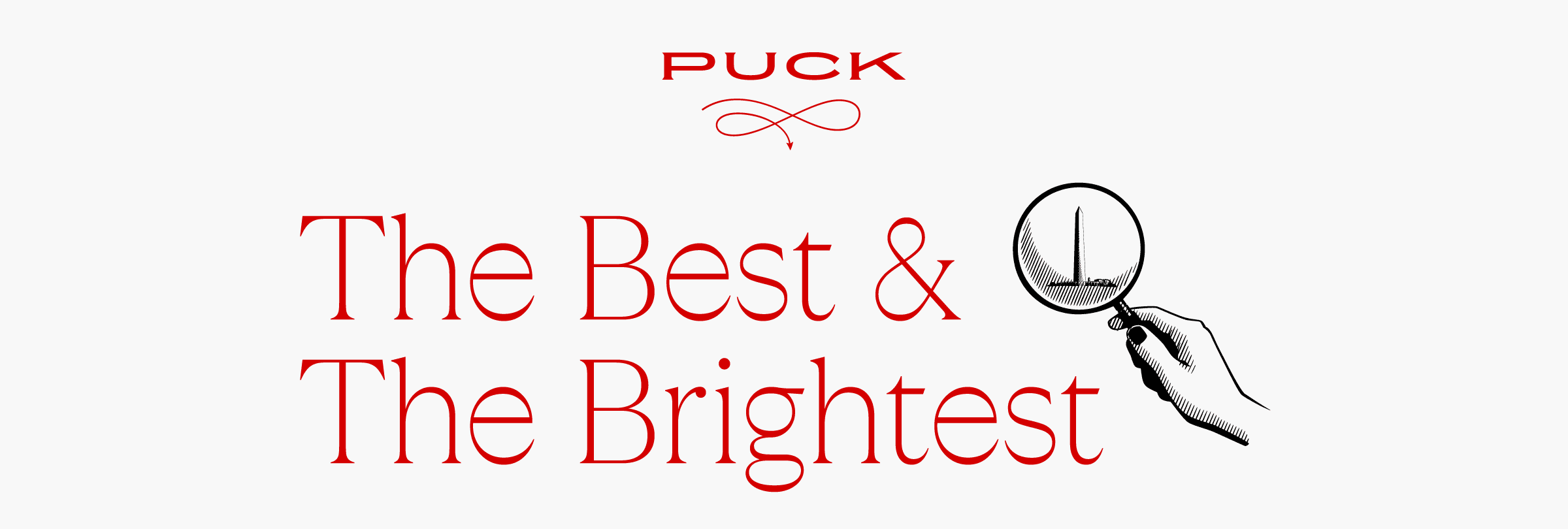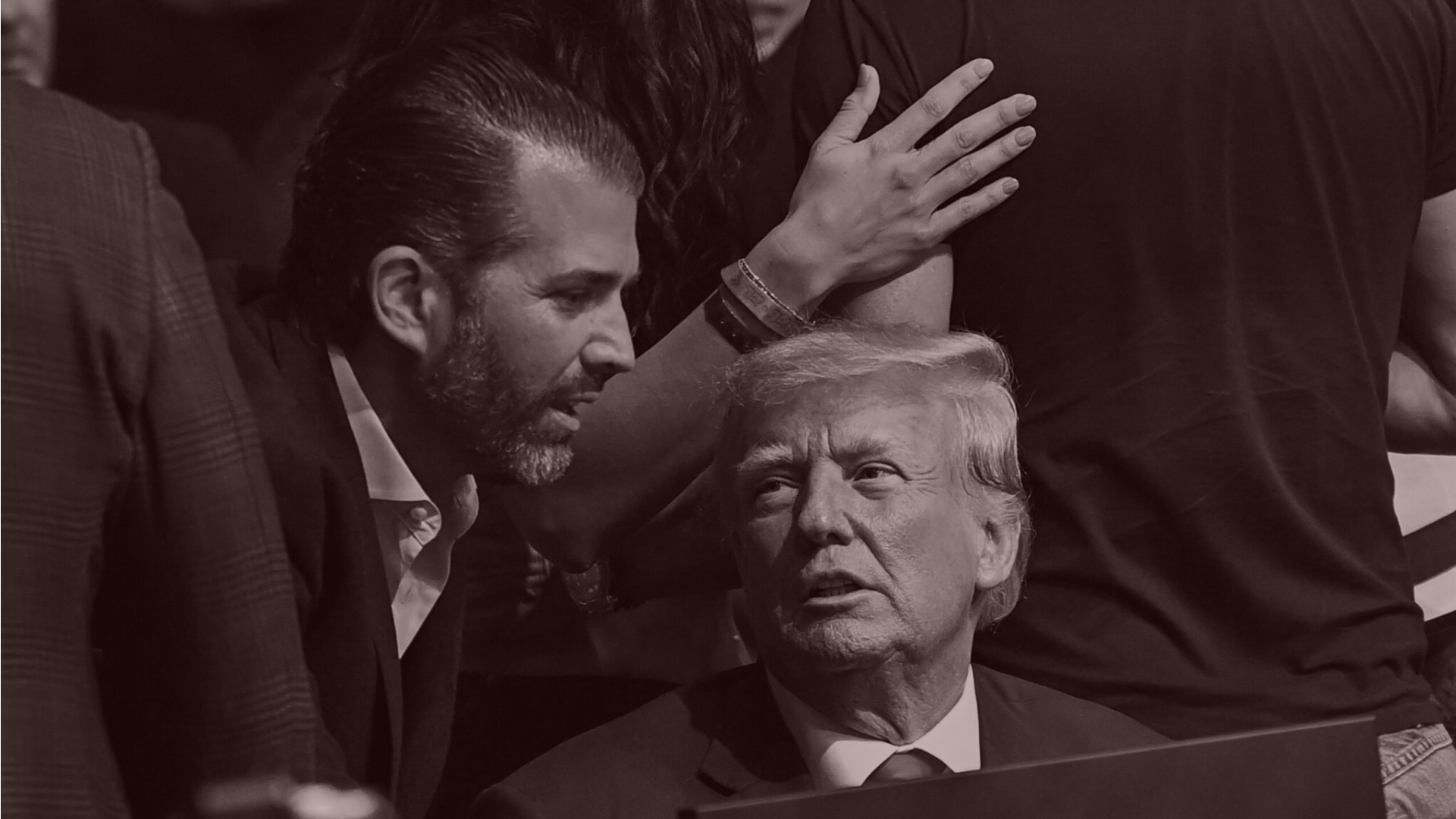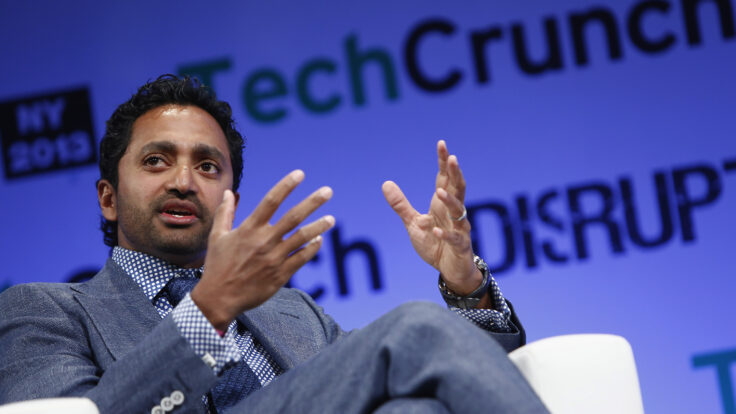 |

|
|
Welcome back to The Best & The Brightest. I’m Tara Palmeri.
We’re less than four weeks out from the election, and I’m sensing intense anxiety in Washington, where Democrats and Republicans, alike, don’t seem fully prepared for the possibility of a second Trump administration. Mark Leibovich, my guest on the latest episode of my podcast, Somebody’s Gotta Win, agreed. “People don’t think a lot about the possibility of Trump winning,” he said, observing how much of the town’s trepidation is currently being channeled into the campaigns.
Earlier today, an anti-Trump Republican texted me to echo the sentiment. “You’re so right about D.C. not being ready for Trump,” he wrote. “Through all the thinking and planning we’ve done, there’s a collective willful blindness.”
Well, I can report that the Trump team is forging ahead, regardless of whether Washington has its collective head in the sand. In fact, Donald Trump Jr. has assumed the role of de facto transition chief, even if the campaign is giving the General Services Administration agita by refusing to sign the ethics paperwork that facilitates the transfer of power. More on all that, below the fold.
🎧 Programming note: Tuesday on Somebody’s Gotta Win, Democratic Rep. Brendan Boyle of the Philadelphia area and Trump’s Pennsylvania advisor David Urban debated the battle for the election’s most critical swing state. We got into the weeds about the state’s various counties, media markets, and voting proclivities. Listen here.
Now, here’s Abby Livingston with the latest chatter on the Hill….
|
|
A MESSAGE FROM Instagram
|

|
|
Introducing Instagram Teen Accounts: a new experience for teens, guided by parents.
Starting in September, Instagram is launching Teen Accounts with built-in protections limiting who can contact teens and the content they can see. Plus, only parents can approve safety setting changes for teens under 16.
So parents can have more peace of mind when it comes to protecting their teens.
Learn More
|
|
|
| Biden Age Aftershocks & Senate Control Sangfroid |
|
Mid-October marks the beginning of the end of the election season, as voters head to the polls for early voting and it starts to become clearer which candidates have the juice and which others have a glass jaw. Meanwhile, some operatives are already beginning to envision 2026. Here’s the view from the Hill…
- A gray wave?: The Democratic Party has a bad habit of encouraging older members to stick around past their sell-by date, thanks to party mores that prioritize seniority above all else in committee leadership. As a result, Democrats have struggled much more than Republicans with aging members hanging around the Rotunda, clinging to their perches, despite sometimes overt signs of physical and mental decline. Younger Democrats mostly grumble in private over their elders’ unwillingness to make room for new blood.
That might change next cycle, according to a Democratic consultant who predicts a brutal 2026 cycle of intraparty warfare, with much more pressure on aging House and Senate incumbents to retire—and short of that, potential primary challenges.
The zeitgeist changed over the summer with Biden’s decision to withdraw, according to this consultant, and the wait-your-turn mentality is losing its appeal. “Joe Biden passed the torch to the next generation, and our nominee has been running on a new way forward,” he said of Kamala Harris. “How are any Dem incumbents in 2026 going to argue against primary challenges to them—regardless of ideology—that suggest it’s time to turn the page?”
Traditionally, Democrats hate primaries, which drain party resources and consume media oxygen, and will do anything to avoid them. But the Biden debacle represented a breaking point for ambitious younger members, testing their deference to the literal old guard. Permission, in a way, has been granted, precedent has been set, and the gloves may come off the next round.
- Bi-polling disorder: Political mood swings are a weekly occurrence on Twitter/X, where every micro-shift in the polling seems to catalyze an outsize reaction. Earlier this week, it seemed Harris had the momentum. Today, her supporters are reaching for the Xanax as a new slew of polling suggests Trump has the upper hand in several swing states. Offline, however, operatives and congress members that I speak with on a regular basis are agnostic about the day-to-day state of this race.
For starters, these people say, the news cycle is so volatile that polling—always a lagging indicator—is less useful than ever, especially in an otherwise mostly static race. And this year, with so much uncertainty in the air, pollsters are struggling more than usual to predict who will actually turn out to vote. (It’s not their fault; nobody knows who’s actually going to show up.)
There is widespread agreement that the Senate is probably headed for a Republican majority. But no one has a handle on who will take the presidency and the House. It has become glaringly apparent in the last few weeks that Democrats are dominating Republicans in party fundamentals: the TV air war, the ground game, fundraising, etcetera. “The lack of a ground game for Trump that’s been widely reported has Republicans very anxious,” a down-ballot Republican consultant told me. “Is that going to be a fundamental factor on Election Day? We are not going to know until after the election.”
As for the Democrats, this was no accident. They worked the entire cycle for these advantages. But you won’t find a semblance of arrogance in the party. There’s lingering P.T.S.D. from 2016, of course, and Democratic strategists closest to the House races are playing it safe, predicting just a one- or two-seat gain. Beyond the party’s structural advantages, it feels like there’s been a decision to avoid party infighting around issues like the Green New Deal or immigration until after the election. Democrats know they can still lose the White House, the Senate, and the House. All of which raises the difficult question: If they did everything right this year and still don’t win, what do they do next?
|
|
|
| Since late July, when Joe Biden deep-sixed his campaign, the Trump brain trust in Mar-a-Lago has been struggling to land decisive blows against Kamala Harris. The vice president should be an easy target, these people have grumbled, given her No. 2 role in a pretty unpopular administration. But Harris, thanks to a flawless campaign launch, winning debate, and the historic nature of her candidacy, seems to have escaped Biden’s gravitational pull. According to a recent New York Times/Siena poll, Harris has a two-point edge as the candidate who “represents change.” Trump and his allies, struggling to weigh her down with Biden’s baggage, have spent $38 million on TV ads highlighting a comment that Harris made more than 14 months ago: “Bidenomics is working.”
Harris, for the most part, has largely avoided generating fresh gaffes by keeping her distance from Biden—walking the line between defending his record on the economy and positioning herself as a fresh start. So you can imagine the glee this past week when The View co-host Sunny Hostin asked Harris to name something specific she would have done differently than Biden during their time together at 1600 Pennsylvania Avenue. “There is not a thing that comes to mind,” Harris replied. Within hours, Trump allies were packaging the clip for digital ads.
|
|
A MESSAGE FROM Instagram
|

|
|
Introducing Instagram Teen Accounts: limits for teens, peace of mind for parents.
Parents want their teens to grow and thrive – and to make sure they’re staying safe.
That’s why Instagram is launching Teen Accounts, with automatic protections limiting who can contact teens and the content they can see. Putting built-in limits in place for teens, so parents can have more peace of mind.
Learn More
|
|
|
| Of course, the clip is hardly as scandalous as Mitt Romney’s “47 percent” diatribe or Hillary Clinton’s quip labeling half of Trump voters “deplorables.” Some political observers have compared it to John Kerry’s, “I actually did vote for the $87 billion, before I voted against it,” or John McCain’s “The fundamentals of our economy are strong,” although that too might be wishful thinking. “I’d take an aspirin before equating Harris’s View moment to Kerry’s ‘I voted for it before I voted against it,’ which worked because it reinforced everything negative we were trying to say about him,” said Bush’s former media man Mark McKinnon, who helped defeat Kerry in 2004. “For Harris to say there’s not much she would have done differently during the last four years may have been an unforced error, but it does not reinforce the message the Trump campaign wants to communicate, which is that she’s a radical leftist.” If anything, McKinnon continued, “it may be reassuring to some voters that she’s more in line with Biden’s centrist approach.”
Nevertheless, not-a-thing-comes-to-mind-gate does underscore one of Harris’s central vulnerabilities: running as a challenger instead of an incumbent. There’s no doubt that Harris is in a difficult position, trying to distinguish herself from Biden while not offending his ego or other members of the party. After all, most Democrats support Biden’s accomplishments, even as his favorability remains low. “Through no fault of her own, Harris has been forced into this high-wire balancing act, juggling two competing narratives, being the change candidate while also being proud of the record they have,” said Michael LaRosa, a former Biden administration official. “She should double down and say, Hell yeah, I’m proud of what we’ve done in the past four years.”
A Harris campaign source told me they’re not concerned with the new ads. But other Harris allies have expressed frustration that she wasn’t prepared with a well-crafted answer, or any answer, to a question she knew was coming. “It’s inexplicable that she didn’t have an answer ready to go,” said Steve Schmidt, a Lincoln Project founder who worked for Bush and McCain. “That’s the very first question that Harris should have been prepped for: How are you going to be different than Biden?”
Perhaps Harris was overly concerned about accidentally pissing off the Bidens and their colleagues back in the White House; perhaps she simply froze. Regardless, Harris clearly handed Republicans at least some of the ammunition they were seeking to blast holes in her image as a change agent. “It was the biggest gaffe of the election so far, that will end up in every TV ad everywhere,” said a Trump advisor, seemingly oblivious to the tsunami of toxic sludge coming from their own candidate. “That will run until election day on heavy rotation,” said David Urban, Trump’s advisor in Pennsylvania, adding that nothing else Harris has said so far has “landed perfectly bad.”
The resulting Trump ads interspersed the clip from The View with footage from the botched Afghanistan withdrawal, news reports of crimes committed by undocumented immigrants, and dire economic numbers—albeit from a few years ago. Battleground Republicans are seizing on it, including Rep. John James in Macomb County, Michigan, who quickly clipped it to attack his Democratic opponent, Carl Marlinga. Meanwhile, J.D. Vance is playing a clip of the line at his events.
|
|
|
| While many in Washington panic about the real possibility of Trump 2.0, there are, of course, a healthy number of institutional Republicans looking for an entrée into the administration and homing in on Donald Trump Jr. as their access point. While Howard Lutnick and Linda McMahon are co-chairs of the transition, sources in Trumpworld say that Don Jr. has emerged as the real gatekeeper for top officials looking for a side door into the White House. (Don Jr. and his brother Eric have merely honorary titles in the transition working group.) For those aiming for the top jobs or looking to repent before Trump, the eldest son is running interference.
Last week, Don Jr. told The Wall Street Journal that his job is to keep the “snakes” out of the White House—a comment that was widely interpreted as announcing himself as his father’s real emissary. But those who know Don Jr. don’t exactly see him as a snake slayer. On the contrary, despite his fire-breathing persona online and at rallies, he’s known to be susceptible to flattery, just like his father, and loves to facilitate a reconciliation, perhaps understanding his father’s fetish for a convert. (As Mark Leibovich smartly noted on my podcast: “There’s nothing Trump loves more than groveling.”)
|
|
|
| Historically, instead of keeping people out of Trump’s inner circle, Don Jr. has been the one helping to bring outcasts back in—patching up damaged relationships with former critics like Vance, who desperately needed Trump’s endorsement in 2022 after calling him “America’s Hitler,” or Tucker Carlson, now one of Trump’s closest advisors, after he said he “passionately hated” the man. Another renegade that Don Jr. returned to the fold is Cliff Sims, the former White House staffer who published an unflattering tell-all about his colleagues in Team of Vipers. Sims went on to sue Trump, yet somehow ended up back in the administration, as Trump’s deputy director of national intelligence, thanks to back-channeling from Don Jr., who told his father—who never read the book—that it was actually quite fawning.
Don Jr. has also forged new coalitions, unthinkable back in 2016, by facilitating the endorsement and surrogacy of Robert F. Kennedy Jr. and trying to find him a place in the administration. He’s even empowered rising stars like Vivek Ramaswamy, who is currently investigating how to dismantle government agencies for the transition. And he’s been an advocate for Susie Wiles, which could tip the scale in her favor to land the chief of staff role over contenders like Brooke Rollins and Kevin McCarthy. “Look, he’s a gatekeeper, whether he’s resurrecting people or not,” said a source close to Don Jr. “Jared [Kushner] was super transactional, he was a consensus figure. He was like, ‘I do deals, I don’t have an ideology.’ Don Jr. actually wants to change the party and believes in America First.”
Also unlike Kushner, Don Jr. is not expected to join the administration and is not viewed as someone who would be recruiting any actual experts to run the government. Rather, he’s seen as the loyalty filter who can stress-test fealty to the America First policy agenda and, ultimately, Trump—potentially weeding out frenemies who have acquired the “snake” designation, like John Bolton or Nikki Haley.
It’s hard to say whether he would use his veto power against, say, Gary Cohn, the former “adult in the room” in Trump’s White House, who I’ve been told has been poking around to see if he can fill another role in a second Trump administration. He wouldn’t be interested in running the National Economic Council again, sources say, but he could be eyeing a top job like treasury secretary or Federal Reserve chair. For the Treasury role, of course, Cohn would be challenging much closer Trump allies, like John Paulson or Steve Witkoff, both of whom attended Trump’s rally in Butler last weekend, essentially auditioning for the job. As Don Jr. would probably advise him, reconciliation does take some groveling, too.
|
|
|
|
| FOUR STORIES WE’RE TALKING ABOUT |
 |
|
 |
|
 |
| Estée Succession |
| Revealing the E.L.C. insider in the C.E.O. catbird seat. |
| RACHEL STRUGATZ |
|
 |
|
|
|

|
 |
|
|
|
Need help? Review our FAQs
page or contact
us for assistance. For brand partnerships, email ads@puck.news.
|
|
You received this email because you signed up to receive emails from Puck, or as part of your Puck account associated with . To stop receiving this newsletter and/or manage all your email preferences, click here.
|
|
Puck is published by Heat Media LLC. 227 W 17th St New York, NY 10011.
|
|
|
|




















